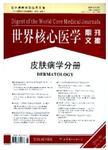在接受择期门诊手术治疗的机械瓣膜患者进行抗凝治疗过程中对ACC/AHA指南的依从性
Adherence to American College of Cardiology/American Heart Association guidelines for the management of anticoagulation in patients with mechanical valves undergoing elective outpatient procedures作者机构:Department of Medicine (Cardiovascular Division) Beth Israel Deaconess Medical Center Harvard Medical School Boston MA United States 不详
出 版 物:《世界核心医学期刊文摘(心脏病学分册)》 (Digest of the World Core Medical Journals(Cardiology))
年 卷 期:2006年第2卷第8期
页 面:18-19页
学科分类:1002[医学-临床医学] 100210[医学-外科学(含:普外、骨外、泌尿外、胸心外、神外、整形、烧伤、野战外)] 100201[医学-内科学(含:心血管病、血液病、呼吸系病、消化系病、内分泌与代谢病、肾病、风湿病、传染病)] 10[医学]
主 题:ACC/AHA 高危患者 抗凝治疗 机械瓣膜 治疗过程 门诊手术 手术治疗 依从性 指南 择期
摘 要:This study sought to establish the practice patterns of a diverse group of academic physicians, in the management of periprocedural anticoagulation for patients with mechanical heart valves, to study adherence to American College of Cardiology/ American Heart Association(ACC/AHA) guidelines. Physicians(n=140) were surveyed to assess strategies for the periprocedural anticoagulation of patients with bileaflet mechanical heart valves undergoing 2 common outpatient procedures. Six patient scenarios with graded risk profiles were presented for each valve location(mitral and aortic). In 90% of high-risk patient scenarios, for which the ACC/AHA guidelines recommend periprocedural anticoagulation, anticoagulation was recommended, with minimal differences between physician specialties. However, periprocedural anticoagulation was also recommended in 70% of non-high-risk scenarios, for which the ACC/AHA guidelines recommend no periprocedural anticoagulation. Noncardiologists recommended anticoagulation more often in non-high-risk patients(p 0.01), especially for patients with aortic valve prostheses. Thus, academic physicians appropriately recommend periprocedural anticoagulation for high-risk patients with mechanical heart valves who undergo elective procedures. However, these data specifically suggest variability in practice for non-high-risk patients that are discordant with current ACC/AHA guidelines, with differences by treating specialty especially notable in this risk subset.



